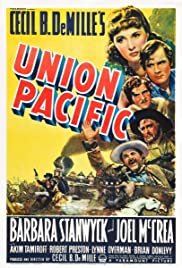
UNION PACIFIC
US, 1939, 135 minutes, Black and white.
Joel Mc Crea, Barbara Stanwyck, Robert Preston, Akim Tamiroff, Brian Donleavy, Anthony Quinn.
Directed by Cecil B. De Mille.
Another Cecil B. de Mille extravaganza on American history, this time the 19th century and the 1860s with the opening up of the railroad, the Union Pacific to California.
De Mille had made The Sign of the Cross, The Crusades and Cleopatra during the early 1930s. This time he moves to a much bigger scale in American history. He was to do the same in such epics as The Plainsman in the same year (with Gary Cooper as Wild Bill Hickock). He was then to make Reap the Wild Wind, The Story of Dr Wassell, Unconquered before he went back to Bible with Samson and Delilah. His last films during the 1950s were The Greatest Show on Earth and his remake of The Ten Commandments.
Barbara Stanwyck is a very strong heroine in any film and is the daughter of the railroad engineer. Joel Mc Crea is also a strong hero, given the task of getting the railway through despite the obstruction by bankers and their henchmen – especially in the form of Brian Donlevy as yet another villain.
Robert Preston and Akim Tamiroff are in the supporting cast as is Anthony Quinn in a small role (aged only twenty). Quinn was to marry Katherine de Mille, de Mille’s daughter.
As with all his epics, the characters and the action are larger than life – a type of big-screen comic book presentation of American history with clear struggles between good and evil. The film culminates in a train wreck – one of de Mille’s masterpieces (and he repeated this kind of effect in the train crash in The Greatest Show on Earth).
1. How enjoyable was this Cecil B. de Mille picture of the West? A good Western?
2. The cinema techniques of 1939: black and white photography, rousing music, special effects, especially the train crashes, location photography, the atmosphere of vastness of the West and the railroad?
3. The title, the impact of the railways in America, the patriotism for the United States, the initial caption about the history of the railroad? The role of the railways and the trains in building nineteenth century America? The men and women involved in the building of the railroads?
4. The American tone of the film, the post-Civil War atmosphere, California and the hopes of the railways, President Lincoln and his support of the railways, the linking of one side of America to the other? The background to this sprawling western? The presentation of Burroughs and his type, the amount of greed and trickery in the West? His trying to make money and exploit the railroads? the irony at the end when he was made to work the railroads, his hammering the final peg? The film's comment on this kind of exploiter?
6. Campbell and his type of villainy in the West, the symbol of his drink, his attitude towards his job, the creating of evil? The picturing of him with his henchmen?
7. Dick as a partner for Campbell, his background, his being prepared to share with Campbell the evil effects of disrupting the railroad, the ambiguity of his morality, his love for the heroine, his involvement with her, the wedding? the involvement in the robbery? The sharing in the siege? His being saved, showing his gratitude to Jeff Butler, his going to work for the Central Pacific? The irony of his death in saving Jeff for the heroine? An ambiguous character of the American West?
8. Jeff Butler as the hero, the strong type, the Civil War background, his skill as an engineer, his work for the railroads, his skill with the men, his persuasiveness? His background of fighting with the Indians? The sequence in the saloon where he shoots the card player? His getting the men to go to work by tricking them? The picturing of his clash with Campbell? His love for the heroine?
9. Jeff's investment in her? Sharing in the wealth with her and Dick? His being saved because of Dick's death? The happy ending? The typical ingredients for an American hero of the West? How attractive was Barbara Stanwyck as the heroine, the Irish background, her vigorous nature and work on the post office of the train? Her relationship with her father and his work on the train? Her friendliness with Dick, her love for Jeff, their clashes? her marriage to Dick? her helping him escape and Jeff's reaction to this? Her awareness of the truth about her love? Sharing the danger of the siege, being shot, recuperating? The happy ending?
10. The film's portrayal of the men of the West: the railroad officials, the engineers and their skills, the drivers? the importance of the driving of the train into the towns, across the territories, the sequence of the rails laid on the snow and the spectacular crash and the death?
11. The portrayal of the Indians? How accurate, unsympathetic? Racist overtones? The siege of the train and the deaths?
12. The portrayal of the dangers of the West, the conventional presentation, the military to the rescue etc.?
13. The symbolism of the ceremony with the linking of the railroads, the humour and the irony?
14. The film said it portrayed a vision of the West? What were its main ingredients? The presentation of patriotism, frontier life, nineteenth century enterprise?